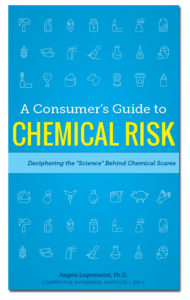The Real Scoop About Chemicals
We hear on a nearly daily basis that mothers should worry about chemicals impacting their babies in the womb, leading to developmental and other health problems later in life. We are told that pesticides are contaminating our food, and that more people are getting mysterious cancers. But how to man-made chemicals really impact our children, families and ourselves?
Is it all really bad news? The links below offer a different perspective, one backed up with scientific references and common sense.
 Chemicals in Perspective
Chemicals in Perspective
Constant media news stories and alleged dangers associated with chemicals along with and activist hype has blurred reality about the importance of chemicals in human progress. Worldwide, the average human life span has increased from about 30 years at the beginning of the 20th century to more than 60 years today, and it continues to rise.
 Cancer Risk Factors
Cancer Risk Factors
The claim that chemical pollution is a major cancer cause is wrong. Second, agencies have relied on faulty scientific methods that grossly overestimate potential cancer deaths from chemicals and potential lives saved by regulation. As a result, regulatory policy tends to divert billions of dollars from other life-saving uses.
 Cancer Trends
Cancer Trends
In recent decades, many have claimed that cancer is rising because of increased use of man-made chemicals. But if chemicals were a source of health problems, one might expect that as chemical use increased around the world, there would be a measurable adverse effect on life expectancy, cancer rates, or other illnesses.
 Endocrine Disrupters
Endocrine Disrupters
You’ve probably heard the claims that chemicals are disrupting our hormones. They disrupt the development of babies in the womb, childhood development, our learning ability, and they make us fat. But none of it is true.
 Honeybees & Pesticides
Honeybees & Pesticides
If you believe the headlines, honeybees may soon be endangered, pesticides are to blame, and regulations offer an easy solution. Yet headlines belie the truth of the matter: Some honeybees have left their hives to never return, but we really don’t know why.
 Pesticides & Your Food
Pesticides & Your Food
Pesticide levels rarely, if ever, approach unsafe levels. Even when activists cry wolf because residues exceed federal limits that does not mean the products are not safe. In fact, residues can be hundreds of times above regulatory limits and still be safe.
 Pesticides, Pests & Your Health
Pesticides, Pests & Your Health
In recent years, public health authorities have expressed serious concerns regarding what they call the trend of “emerging infections.” They fear that many diseases transmitted by various pests—collectively called “vectors”— are on the rise.
 Pesticides in Schools
Pesticides in Schools
In recent years, policymakers have been confronted with claims that children face dire public health risks associated with the use of pesticide products in schools. Although these laws may be well intended, they could actually create more serious health hazards for children associated with increased risks from pests.
 Are Pesticide Laws Strong Enough?
Are Pesticide Laws Strong Enough?
There are lots of activist groups, green marketers, and others who claim that pesticides we use in our home, communities, and crops pose serious dangers. The underlying assumption is that existing pesticide regulations are insufficient to protect public health. Yet these sites never adequately explain the laws, the exposure levels they regulate, and likely health risks.




